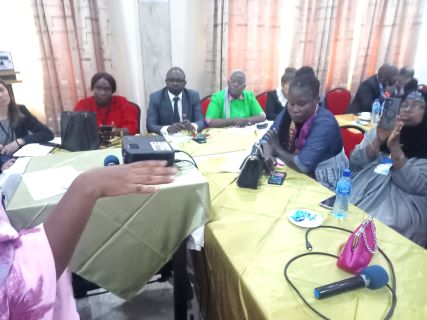By Dan-Maryam Zayamu
In an effort to improve general cancer care in Nigeria, the Federal Government has organized a townhall meeting to brainstorm and get input from stakeholders in the cancer space on the gaps and challenges militating against efficient cancer care in the country. The townhall meeting which was held in Abuja, on Tuesday, is to enable members of the imPACT Review Committee understand clearly the contemporary challenges and the gaps in cancer care in Nigeria.
The imPACT Review Committee comprises both local and internation experts in cancer care including the World Health Organisation (WHO) and the International Atomic Energy Agency (IAEA).
It would be recalled that the IMPACT Review Committee led by Laura Haskins, has been in the country since the past two weeks, assessing the readiness of the country to fight cancer both in terms of human resources and infrastructure.
Speaking with newsmen, the Director General of the National Institute for Cancer Research and Treatment (NICRAT), Prof. Usman Malami Aliyu, said the meeting is aimed at gathering input from stakeholders, including Non-Governmental Organizations (NGOs), professional associations, and members of the academia to identify the challenges and proffer solutions for cancer control in Nigeria.
These efforts, he said, will culminate in a report that the government can use to improve cancer care nationwide.
Represented by the Director, Clinical Services, Prof. Musa Ali Gombe, the NICRAT DG said his Institute has put in place strategies to reduce cancer to the barest minimum in the next few years.
He explained that the imPACT review is to evaluate cancer care, from prevention and diagnosis to treatment and palliative care.
The gaps that will be identified at the end of the of the review, he said, will determine the future strategy and steps to be taken by the federal government in order to improve the cancer situation in the country.
Prof. Malami revealed that NICRAT has launched a national cancer registry and is collaborating with international and local partners on clinical trials and research.
“Strengthening cancer registries and building local capacity for cancer care are central to NICRAT’s ongoing initiatives.
“NICRAT is also focused on research, launching a national research agenda and establishing collaborations for clinical trials, including with global institutions like the Mayo Clinic,” he noted.
Speaking, Laura Haskins, from the IAEA, disclosed that the cancer impact review was requested by Nigeria’s Ministry of Health and Social Welfare.
According to her, alongside WHO and IAEA, the review aims to assess Nigeria’s cancer control capabilities, covering prevention, diagnosis, treatment, and care.
She further explained that her team which comprises international and national experts will provide a report with evidence-based recommendations tailored to Nigeria’s needs, focusing on identifying and addressing gaps in cancer care across the country.



